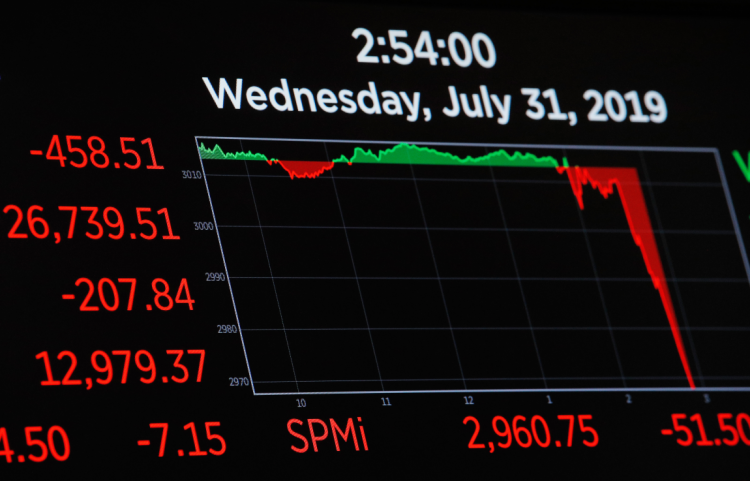President Donald Trump's travel ban against Europe, and his blaming Europe for worsening the COVID-19 epidemic in the United States, hurled the Dow Jones Industrial Average to a 2,352 point loss Thursday, its worst day and its biggest one-day percentage drop since 1987. His declaration of war against Europe pushed many global stock markets over the edge. European markets posted their biggest falls ever.
The Dow closed 2,352.60 points lower, or 9.99%, at 21,200.62. The breathtaking plunge was the Dow's worst drop since the 1987 "Black Monday" market crash, when it collapsed by more than 22%. The S&P 500 plummeted 9.5% to 2,480.64, joining the Dow in a bear market. It also had its worst day since 1987 and is now down about a quarter this year in only 16 trading sessions. The NASDAQ Composite closed 9.4% lower at 7,201.80.
"Black Thursday" is now being called the day the 11 year-long bull market run officially died.
"We are going into a global recession," said Mohamed El-Erian, chief economic adviser at Allianz, on CNBC. "After what's been happening in the last few days, we are going to see a spread of economic sudden stops."
He believes the selling won't stop until the bear market plunges by 30%.
"The trouble with economic sudden stops is it's not easy to restart an economy," said El-Erian.
The bloodbath caused by Trump rampaged worldwide and pushed global stock markets over the edge and into bear territory. Much European stocks markets closed Thursday reeling from the worst day in their histories as Trump's travel ban pummeled already weak airline and travel companies.
Europe's Stoxx 600 index that tracks hundreds of European firms across the continent's biggest economies plunged more than 6%. So, too, did France's CAC 40 and Germany's DAX. Britain's FTSE 100 lost more than 5%.
Asian stock markets tanked for the second straight day Thursday. Equity markets in Australia, Indonesia, Japan, the Philippines and Singapore followed the Dow into the bear market territory. Hong Kong's Hang Seng Index lost as much as 4.4%, coming close to a 20% decline since its April peak (the definition of a bear market) for the second time in as many years.
"The virus spread in the U.S. looks out of control," said Alan Li, portfolio manager at Atta Capital. "Even the NBA (National Basketball Association) is suspending play."
U.S. small-cap benchmark, the Russell 2000 index, on Thursday plunged 11.2% to 1,122.93, a loss of 141.37 points. For the week, the Russell 2000 is down 326.31 points, or 22.5%.
Gold plunged to nearly $1,600 an ounce, down 3%, despite a huge drop in producer prices. Oil prices plummeted again. Brent crude, the global benchmark, fell 7% Thursday to $33.30 a barrel after Trump announced the travel restrictions with Europe. U.S. crude oil prices plunged another 6% to $31 a barrel on Thursday. It earlier dropped to as low as $30.02 a barrel.
"The coronavirus is scary and people don't know what to expect," said Kathy Entwistle, senior vice president of wealth management at UBS. "It's like the tsunami is coming. We know it's going to hit any day and nobody knows what the outcome is going to be."
"The crux of the angst investors are feeling as the coronavirus spreads surrounds what might happen to consumer spending," wrote Scott Wren, senior global market strategist at Wells Fargo Investment Institute.
"Consumers sitting at home and not out spending money because they fear catching the coronavirus is the ultimate negative outcome," he noted. "It has been the U.S. consumer who has been driving the recovery bus during this long expansion."
Directly triggering the global equity bloodbath was Trump's widely reviled television address Wednesday evening where he effectively blamed Europe -- and not his bungling the U.S. response to the COVID-19 pandemic -- for the economic crisis ripping apart U.S. markets.
Trump announced the U.S. will impose a 30-day ban on foreigners who in the past two weeks have been in the European Union's Schengen Zone. This zone consists of 26 countries that abolished border and passport controls at their mutual borders to encourage free flow of goods, people and services.






